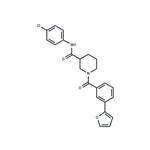CCG 203971 acts as an antifibrotic agent, inhibiting fibrosis through targeting the MRTF/SRF gene transcription pathway. Inhibits the invasion of prostate cancer cells and acts as a potent anti-proliferative agent.
CCG-203971 is an inhibitor of the Rho/MKL1/SRF transcriptional pathway, which has been shown to play a role in metastasis of melanoma and breast cancer and clinically associated with castration-resistant prostate cancer. CCG-203971 is a second-generation analog of CCG-1423 (SML0987) with an IC50 of 4.2 μM vs 1 μM for CCG-1423, but less cytotoxicity. In mouse studies, CCG-203971 inhibited invasion of PC-3 prostate cancer cells and was well tolerated up to doses of 100 mg/kg IP over 5 days. The Rho/MRTF/SRF pathway has also been shown to be involved in multiple types of solid organ fibrosis. CCG-203971 repressed both matrix-stiffness and TGF-β-mediated fibrogenesis in human colonic myofibroblasts and showed antifibrotic activity in a murine model of skin injury and in pulmonary fibrosis lung fibroblasts.

